Rome (Italy). On 15 April 2023, the 2nd meeting of the Online Seminar on Integral Ecology was held, proposed by the Salesian Family Sector of the Institute of the Daughters of Mary Help of Christians to Past Pupils of the FMA, Salesian Cooperators, and ADMA members.
Sr. Leslie Sándigo, General Councilor for the Salesian Family; Sr. Lucrecia Uribe, World Delegate of the SSCC and World Animator of ADMA; Sr. Gabriela Patiño, World Delegate of the FMA Past Pupils; and 25 members of the World Councils of the three Associations were present.
“Dwell in the common home” was the theme explored in this second meeting, with the aim of becoming aware of everyone’s responsibility for the common home, before it is too late.
To guide the reflection to answer the question “Which inhabitants for the common home?” there was Brother Alberto Parise, a Comboni missionary who, at the Generalate of the Comboni Missionaries in Rome, coordinates on a worldwide level the Office of Justice, Peace, and Integrity of Creation of his Institute. In recent years in Rome, he has been a valid collaborator of the Justice-Peace-Integrity of Creation Commission of the World Unions of Superiors General and, through this commitment, he has worked for the creation and animation of the “Laudato Si’ Initiatives Platform”, commissioned by Pope Francis to implement the encyclical. With the Comboni Community, since 2021 he has given life at the General Curia in Rome, to the “Laudato Sì Park”, an invitation to regenerate one’s relationship with God, nature, the world.
Br. Alberto underlined how today the commitment of global citizenship is necessary to unblock the situation and handed over three guiding stars to give life to Laudato Sì: Ecological Conversion; Total Sustainability; Prophetic Mobilization.
He affirmed, “Integral Ecology invites us to look at today’s situation in a different way, in the awareness that the socio-environmental crisis derives from a distorted anthropology which, while reducing the human person to an isolated individual, mostly understood as homo oeconomicus, considers nature exclusively as a resource to be exploited, thus leading us to a departure from the vital relationship we should have with the Creator.
The inhabitants of the common home are required to take a multiple approach to the ecological crisis, which simultaneously faces the economic, social, and environmental crises we are experiencing, and seeks integral solutions, i.e., such that they consider the interactions of natural systems with each other and with social systems, including also the cultural and spiritual dimension”.
To continue the reflection and focus on concreteness, Sr. Maridele Sandionigi, FMA of the Lombardy Province of the Holy Family (ILO), presented a good practice in place in her Province, in which she coordinates the LS Commission. Degreed in economics and business management, Sr. Maridele attended the course for the Animators of the Laudato Si’ Movement. She is a “student of the subject” of Social Ethics at the Faculty of Economics of the Catholic University of Milan and is now attending the course for university certification, “The ecological challenge” of the Sophia University, a Catholic academic institution managed by the Focolare Movement in Loppiano, Italy.
The starting point of the proposal was the Chapter Deliberation of GC XXIV, which led the Province to set up a Laudato Si’ Commission. This involved all the communities of the Province, lay people, and Sisters. During the first year of its work, the Commission proposed to dedicate a period of study and reflection on the topic, through discussions with some experts. Three convictions were born from the study:
- Laudato Si’ is not only a content; it is above all a method: “everything is connected”.
- “Biodiversity” as a value.
- A new anthropological approach for a “new humanism”: the transition from the “animal paradigm” of “competition” to the “vegetable paradigm” of “cooperation”.
Sr Maridele affirmed, “As the economist Luigino Bruni says, the economy is made up of many choices, including ours. We won’t get out of this crisis if we don’t also start looking at our responsibilities, as families and as consumers. Now is the time to give up the animal/predatory model of doing business and living the economy and switch to a vegetable model. The law of the forest is interaction, mutual benefit, cooperation, which comes before competition. We must begin to consider the world as an ecosystem in which everyone plays their part in the logic of cooperation.
Above all, it is necessary to rebuild ourselves, “resetting” our categories of thought, to retune ourselves on a wave of well-being for the whole community bearing in mind some elements: no to competition, yes to cooperation; the most fragile must dictate the pace; relationships are at the heart of existence; essential goods must be guaranteed to all and must be managed as common goods.
We must not sacrifice relational goods: friendship, trust, cooperation, reciprocity, social virtues, social cohesion, solidarity, peace, working climate in companies. The personal and social identity of individuals therefore depends on relational goods”.
She then recounted the journey that led to the development of a Vademecum Laudato Si’ which refers to the 7 objectives proposed by the LS platform, with the proposal of small daily actions calibrated on the reality of the different communities, to arrive at the most concrete actions possible.
After listening to the rich presentations, each head of the World Councils presented the journey made by each Association, as a commitment undertaken by the first Laudato Sì seminar, held on 15 October 2022.
Lastly, Sr. Leslie thanked everyone for the steps taken and invited them to continue the process until reaching feasible proposals that allow for registration on the Laudato Si’ Initiative Platform.


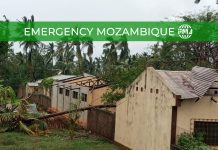
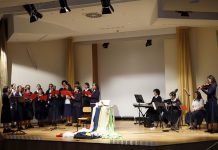
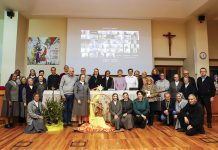
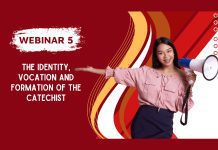
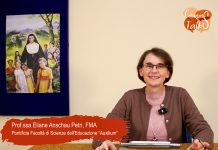

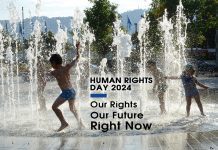
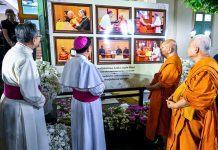
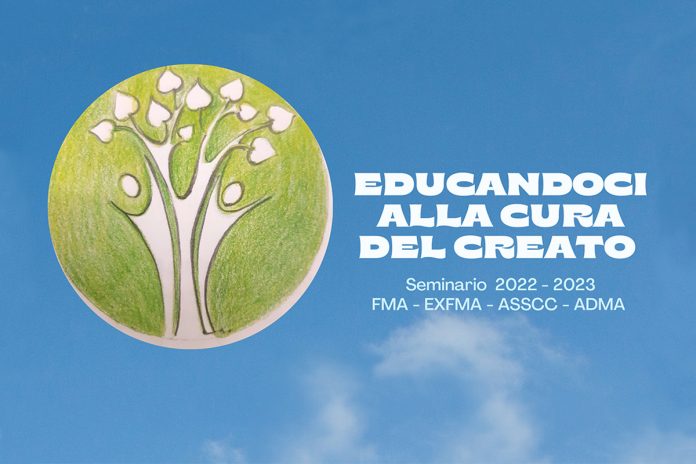
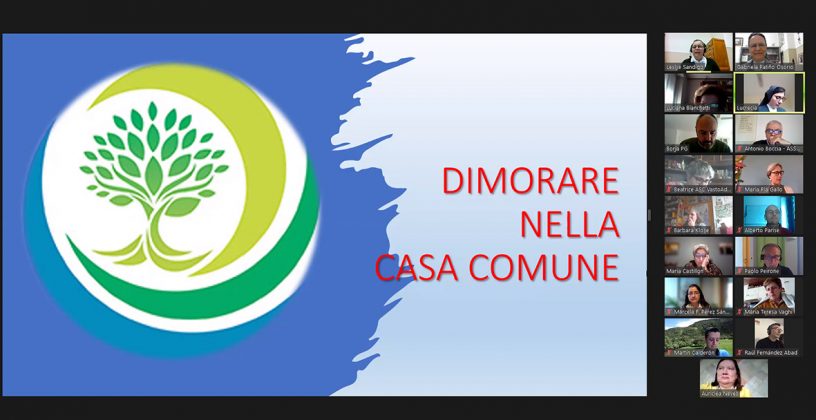
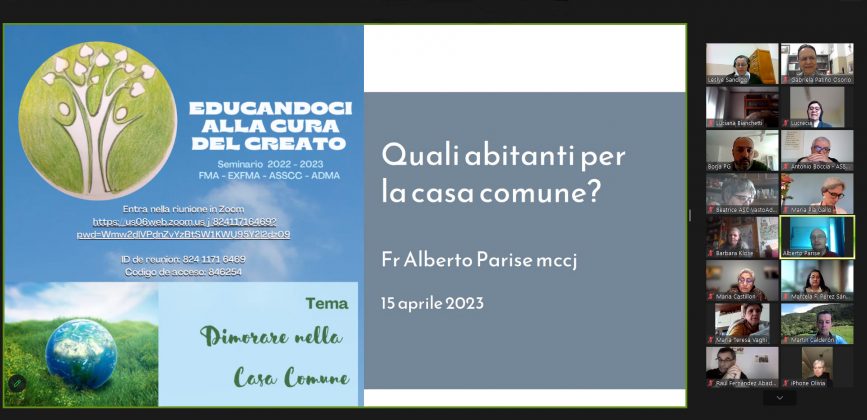
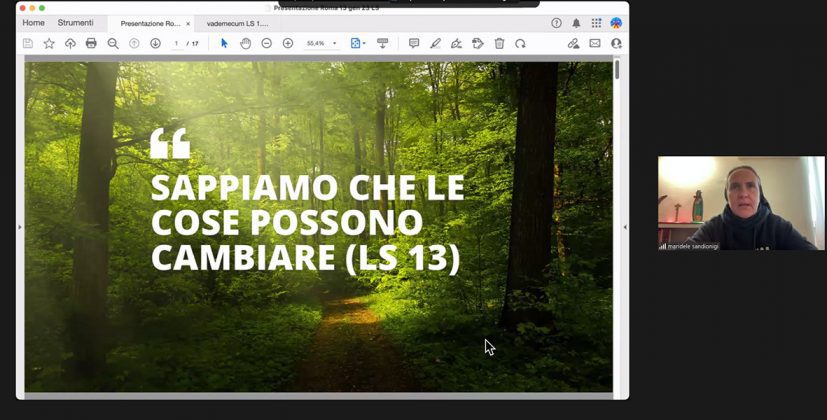










Muchas gracias. Realmente interesante e inspirador el contenido del encuentro Gracias sor Leslye por proponerlo. Felicidades, saludos y oraciones.